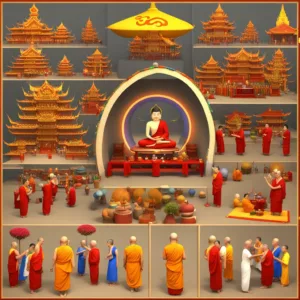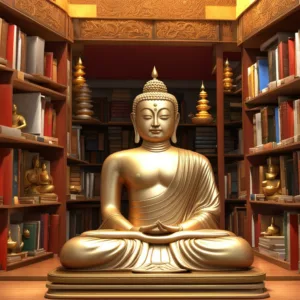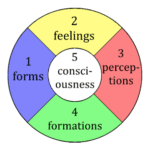The 2nd paramita of discipline (Shila, Tsultrim (Tib.)) is the ethical approach of the bodhisattva. The main tenets are:
- Cause no harm
- Create benefit
- Maintain the Hinayana precepts
- Never forsake compassion for sentient beings
- Stay true to the dharma
Secrets of Meditation for Anxiety
Like millions of people, you may have suffered from anxiety for years. Meditation, yoga, peaceful music – it never works. It takes too long, and it’s not stable. Why? Because peace is treated as a cause for freedom, but it’s not – it’s the result. The cause to free yourself from anxiety is completely different.
Click now to Overcome Anxiety for good.
Table of Contents
What are the 6 perfections?
The 6 perfections are the paramitas, the transcendent virtues of the bodhisattva which lead to buddhahood.
- Generosity / Dana paramita
- Discipline / shila paramita
- Patience / shanti paramita
- Exertion / virya paramita
- Meditation / dhyana paramita
- Wisdom / prajna paramita
Shila: the second paramita

Relative bodhicitta is the basis of shila. One core formulation for discipline is exchanging yourself for others. This formula, while aiming for an intuitive approach, is somewhat confusing. It could mean: take in the suffering, offer happiness, without martyring oneself. Or, it could mean that self and other are essentially equal in that everyone goes through the karmic process of suffering, death, and rebirth.
Patience is associated with the latter part of the second point of the Lojong mind training: the main practice which is training in bodhicitta. The 4 relative bodhicitta slogans:
- Sending and taking should be practiced alternately. These two should ride the breath
- Three objects, three poisons, and three seeds of virtue
- In all activities, train with slogans
- Begin the sequence of sending and taking with yourself
In Training the Mind, Trungpa says this is not about “you jump into my nice warm bath and I’ll jump into your cold bath,” but is about exchanging “hypocrisy for genuineness” and overcoming any sense of territory. That possessiveness, territory, is an obstacle to realization. It’s another form of non-generosity, a more subtle one.
In any situation you see someone in, you have also been there in another life. Or will be in future. So instead of feeling envious that someone has a more attractive partner, a nicer home, lots of money, fame, popularity, or good friends, or instead of feeling condescending to those worse off, with dull jobs, poorer, less attractive, realize that person IS you in another life.
Everyone suffers. Who can see the unspoken pain of another?
Also, we cannot know the hidden sufferings and joys of anyone else. The poorest person may actually be incredibly happy. The wealthiest may be miserable and afraid, uncertain who their true friends are, knowing they will die one day and lose it all. The wandering vagrant may feel completely free, unburdened by the things that cause us anxiety on a daily basis. We don’t know, in other words.
Discipline is also giving up your own easy, comfy, cozy life, pushing yourself out of your comfort zone in order to help others. If we see a person broken down on the side of the road, well, they likely have a cell phone and can call a tow truck. But it doesn’t hurt to pull over and see. Maybe it’s a woman by herself or with children and she’s afraid.
Part of discipline is also not giving up on people. If you’re in a conflict with a long-term friend and they say something nasty to you, you’re unlikely to end the friendship right away and think “I’ll never speak to them again.” But you might do that with someone you just met.
Don’t be so predictable
Lojong Slogans of Atisha
Discipline flips the script on this: I will just wish them the best. Maybe I will or won’t see them again, it doesn’t matter, but I won’t hold a grudge. They could be having a bad day.
In fact, discipline from this perspective, can be the opportunity to practice the 3rd paramita, which is patience. So you appreciate them for that, for giving you the chance to practice the paramitas. This sense of constantly thinking of others and how to benefit them and not centralizing on yourself is the core of discipline.
Unceasing Focus – gamify discipline
The paramita – other shore – of discipline is when it becomes joyful. Discipline is supposed to create a very joyful mind. Another, very committed aspect of discipline is constant engagement with the Dharma, meaning truth. The truth of reality, the truth of compassion can constantly urge us on, in every situation. Like websites where everything is gamified to make them more fun, the path becomes a sort of infinite childlike play, seeing how compassion can be practiced in the best manner.
Discipline brings joy
Gamify your approach to the dharma. You’re not looking for points or badges, of course, but they come anyway in a far better form: transcendent virtue! In this way, turn everything you do into an unbounded game of seeing how the dharma applies. What can you learn about yourself to be a better practitioner or about others to more skillfully relate to them? How can you see it as empty? Can you see an opportunity to help someone in a playful way? (Watch the movie Amelie for inspiration.)
Maybe you just like to make people smile, or laugh. A compliment, a kind word, a secret smile – use your native personality. Constantly connecting with people in a loving, appreciative, inquisitive way is a highly enjoyable form of discipline.
Work with the greatest defilements first
Lojong by Atisha
Many methods of shila exist. In the above slogan, you simply look where your greatest hangup is. Are you too angry, too envious, too desirous of small pleasures, or sex, do you feel impoverished, a workaholic – it doesn’t matter what. Just find it.
From that perspective, you work on that neurosis and apply discipline – not like a slave – but like an extreme athlete. Great athletes enter the state of flow to increase their skills. Time passes differently, and the whole relationship to body and to space changes. They become extremely grounded in the moment.

Flow, the profound mental state, also called Peak Performance, can be attained with meditation and can be ‘triggered’ at will, with enough discipline. Guide to Flow Mastery will teach you how.
People in flow become capable of unbelievable feats of athleticism, training, learning, and accomplishment. The same can be true of you if you enter the flow state by constantly focusing on dharmic outcomes. In this way, vision changes it from dharma being a hobby or a spiritual carve-out to one’s way of life, even to the fundamental, underlying basis of every moment of life.
This can be completely integrated into everyday life. There is no obstacle at all. In fact, by doing so, life becomes much easier, smoother, and more delightful. It becomes playful. That is the transcendent virtue of discipline.
5 precepts
Taking the five precepts that accompany refuge is a basis for discipline from a Hinayana perspective. They are:
- Do not steal
- Do not lie
- Do not steal
- Do not commit sexual misconduct
- Refrain from intoxicants
10 Virtuous and Nonvirtuous actions
The ten virtuous and nonvirtuous actions are mirrors of each other. The 10 virtuous actions are simply refraining from the non-virtuous actions.
- Three actions of body to engage
- Protecting, rather than taking life
- Not taking property
- No sexual misconduct
- Four actions of speech
- Speak truth, rather than lying
- Speak gently, not harshly
- Bring people together, rather than divisive talk or gossip
- Speak meaningfully, rather than idle chatter
- Three actions of mind
- Contentment, rather than covetousness
- Love, rather than hate
- Right view (reality of karma, truth of suffering, emptiness) rather than wrong view (emotion, nihilism, egoism, fixation, eternalism, etc.)
Secrets of Meditation for Anxiety
Like millions of people, you may have suffered from anxiety for years. Meditation, yoga, peaceful music – it never works. It takes too long, and it’s not stable. Why? Because peace is treated as a cause for freedom, but it’s not – it’s the result. The cause to free yourself from anxiety is completely different.
Click now to Overcome Anxiety for good.
FAQ
What is the paramita of discipline?
The paramita of discipline is the bodhisattva perfection of shila – the practice of putting others as more important than oneself.
What is the Shila paramita in Buddhism?
Shila / sila paramita is the practice of transcendent discipline, exchanging self for other. Seeing the suffering of all beings and acting to end that state.
What are the 10 virtues of Buddhism?
Charity / dana
shila / discipline
renunciation
altruism
honesty
gentleness
wisdom / prajna
exertion / virya
forbearance
conviction
maitri / love
equanimity / balance
Conclusion
When applying the dharma moment by moment becomes natural and when joy arises effortlessly with a sense of play, then delight arises because of that. It becomes stable, and strong, and generates almost an aura of power. Then the paramita of discipline has arrived.
Obviously, it needs to be infused with emptiness, not seeing discipline as a thing. It must be void of ego, not thinking of yourself as a great, disciplined being. If you really delight in and enjoy it, it won’t be an egoistic pursuit. It would be a somewhat thick, degraded form of pleasure. It wouldn’t be fun.








